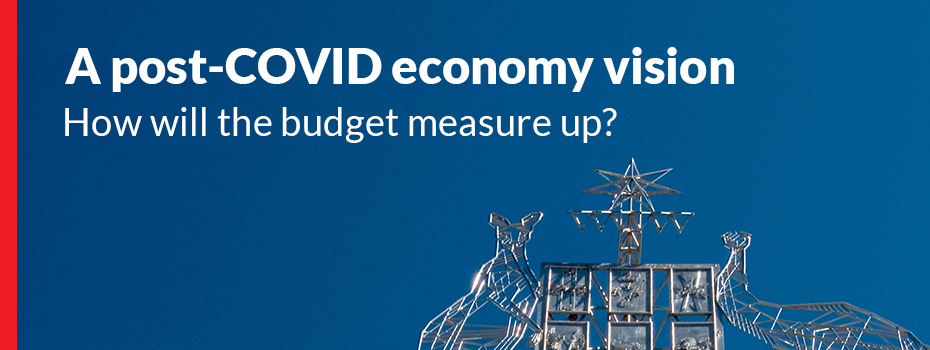A post-COVID economy vision: how will the budget measure up?

With less than a month until Treasurer Josh Frydenberg hands down the Federal Budget, industry bodies have released a flurry of economic reform proposals hoping to help the Government steer Australia towards a quicker post-pandemic recovery. Business advocates such as the Business Council of Australia (BCA), the Australian Industry Group (Ai Group) and Australian Chamber of Commerce and Industry (ACCI) have led the pack, recommending greater business investment, extensions to the coronavirus supplement packages, and earlier personal income tax cuts.
The BCA Roadmap to Recovery describes the Federal Budget as the first step of a decade-long recovery process, with a focus firmly placed on job creation. Chief Executive Jennifer Westacott said that 1.5 million new jobs - more than 10 per cent of the pre-COVID workforce – would need to be created to replace the jobs lost or at risk due to the pandemic, as well as technological change. The BCA proposes that the job recovery be driven by a 20 per cent investment allowance at the cost of $10 billion per annum, with its own modelling suggesting this would lift investment by $200 billion and create more than half a million jobs across 10 years. In an interview with 2GB Radio, Ms Westacott said that while it would cost $10 billion per year to “go forward”, the Government’s JobKeeper program was currently costing $12 billion per month “to stay as we are”.
While investment allowance is at the centre of BCA’s submission, the group also recommended the Government brings forward stages two and three of the Personal Income Tax Plan. Expediting these already-legislated tranches has the potential to inject between $10 and $15 billion in Australian pockets and subsequently into the economy. A permanent increase to the JobSeeker payment, in alignment with the Age Pension (between 75-90 per cent as opposed to the 60 per cent it currently sits at) would further stimulate spending. The group has applauded the Government’s already-announced infrastructure spend but called for further collaboration between Federal and State Governments in the form of a 10-year National Revitalisation Plan to create a continuous pipeline of infrastructure and job-creating projects.
When interviewed by the ABC, Ms Westacott said that while the BCA had not given up on the idea of a company tax cut, it would have to take a backseat to other proposed reforms. Yet, the Ai Group has maintained their support for this in their submission calling on the Government to reduce the company tax rate to 25 per cent for companies with up to $1 billion of turnover. This is already scheduled to take effect from 1 July 2021 for businesses with turnover of less than $50 million. Ai Group Chief Executive Innes Willox believes this would strengthen the stimulatory effect better than the BCA proposed investment allowance as it would put more money in the hands of business to “invest in whatever they assess as best for their business and not just the assets to which the investment allowance applies”.
Both the Ai Group and BCA agree that spending on infrastructure is the right call. Ai Group has endorsed the need for Federal and State Government collaboration and faster infrastructure approval processes, adding calls for much needed reform to the VET sector. This is to include wage support for new apprentices and trainees, pre-employment incentives to boost youth participation, new skills assessment and training for workers affected by COVID, as well as new funding agreement between Federal and State Governments to better address the overall decline of subsidies across the sector.
The ACCI pre-Budget submission joined the BCA and Ai Group in acknowledging the enormity of restoring Australia’s economy to pre-COVID status. The Chamber agrees that earlier personal income tax cuts are needed. ACCI CEO James Pearson said that even though Australian household incomes had “been shielded from the pain of COVID-19 restrictions” by the Government’s JobKeeper and JobSeeker programs, bringing the personal tax cuts forward would put money in Australian pockets and the economy when these programs ended.
Income tax is not the only area of tax policy that ACCI wants to see amended though, with much of the submission calling for comprehensive tax reform. The Chamber said that Australia’s current tax system was “too reliant on unsustainable and distortionary taxes” and reform had been continually delayed due to the complexity of the issue. According to ACCI, State governments relied on “inefficient” taxes that impeded business activity such as payroll tax and stamp duty, with the submission calling on the Council of Federal Financial Relations to remove this reliance and find the revenue elsewhere. The Chamber has also recommended the removal of the luxury car tax, wine equalization tax, all customs duties and the fringe benefit tax on entertainment-related expenses, as well as childcare to stimulate consumption in the “areas hardest hit by the shutdown”.
The measures, released in next month’s budget, will be a far cry from what the Australian Government was planning at the beginning of the year, yet far more important than anticipated, as they will define the first part of the long road to recovery. Business will undoubtedly play a significant role in the process, and if submissions from advocacy groups are anything to go by, so will various industries and the reforms they brave.
To access original media releases, and details around submissions used as examples in this article login to Capital Monitor at: www.capitalmonitor.com.au
 LexisNexis
LexisNexis